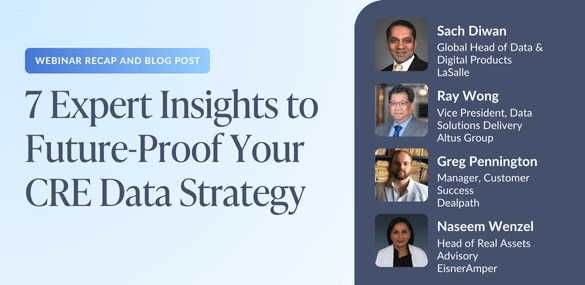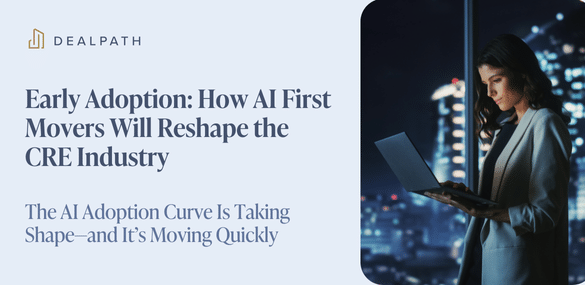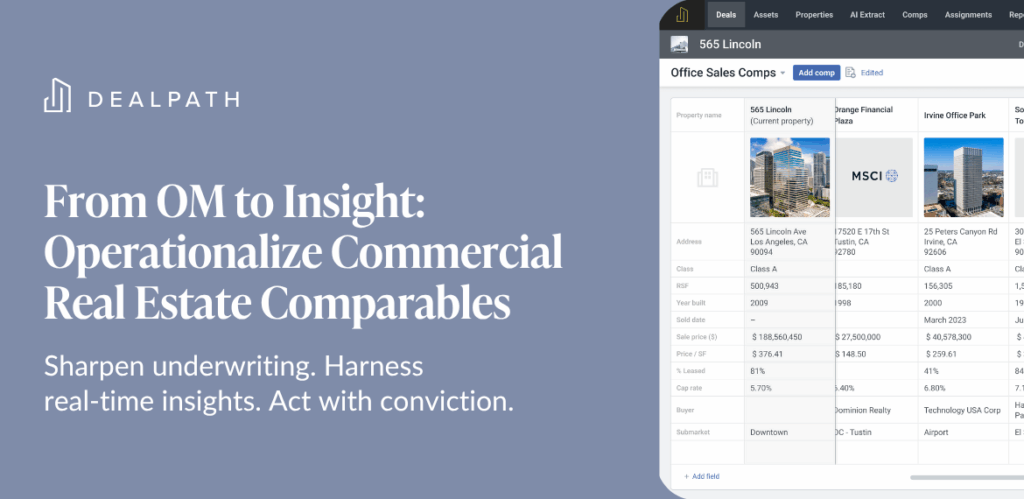It’s no secret that data will dictate the winners in real estate as market conditions shift, deal sourcing evolves, and investors raise expectations. But data alone isn’t enough. To supercharge your competitive edge, you need normalized data standardized within a structured, proprietary database to unlock insights and surface winning opportunities.
How can you sift through the noise to tap into market intelligence when you need it? What actions can you take to tear down data silos? How are analytics setting a new standard for data-driven precision? Where does AI play a role?
Back in 2024, we hosted a panel of thought leaders from LaSalle Investment Management, Altus Group and Dealpath to answer these questions in a discussion about the future of data, decision making and performance in CRE.
To learn the most powerful insights from the webinar, read the recap or watch the summary video.
Watch the Webinar Recap Summary
If you’re eager to see the most important highlights from the webinar, watch the recap via the video below.
Elevating Data-Driven Decisions: The Most Important Insights From the Webinar
Below, we recap some of the most important takeaways that were unveiled during the webinar.
1. Doubling Down on Technology Strategies to Achieve Global Economies of Scale
For LaSalle Investment Management, uncertain market conditions offered the ideal opportunity to reset their technology strategy.
As an industry leader with a global footprint, the firm’s investment strategy is diversified across multiple platforms. Consequently, regional data silos created operational friction. A lull in activity represented the ideal opportunity for LaSalle Investment Management to prioritize technology optimization.
Dubbed “1 LaSalle” and supported by the CEO, this digital transformation project sought to break down these data silos in the pursuit of efficiency. According to Sach Diwan, Global Head of Digital Products, this space offered the firm the time required to centralize its data in a global platform, creating economies of scale. Once market conditions improve, LaSalle–and other firms that seize this opportunity–will be well-positioned to more effectively identify and execute on new opportunities.
2. Delivering Trustworthy AI-Powered Insights With Robust Data Hygiene
AI-driven insights are only as reliable as the data they’re built on. If your data is inconsistently formatted or you lack confidence in its accuracy, can you really scale your investment strategy based on questionable insights?
One trend that panelists observed is a shift away from a “data at all costs” mentality, instead favoring standardized, structured and vetted data. Now that firms are prepared to accomplish more with this data, the need for data governance is stronger than ever–and can prevent the much-feared “AI hallucinations” that could, left unchecked, plague an otherwise sound investment decision.
Consistency, hygiene and methodology are key to instilling confidence and trust across your organization when it comes to acting on AI-powered insights.
3. Attracting the Next Generation of World-Class Talent With Modern Tech
At the height of market activity in 2021, many firms struggled to attract and retain talent as they seized unprecedented opportunities to deploy capital. Now, competition for top talent remains fierce. While this problem is not unique to real estate, there are ways that firms can adapt to win the talent war.
Real estate’s historically slow adoption of technology means that many job seekers are hunting for tech-forward firms with robust data strategies. Automation eliminates time wasted on low-impact work, creating more time for professionals to prioritize high-impact work and backtesting. Employees can better leverage proprietary information to inform decision making with data analytics, offering new opportunities to unleash and strengthen their analytical skills.
From attracting leading talent, to new opportunities for career development and improving employee satisfaction, market-leading technology is key to building and maintaining a high-performing team.
4. Achieving a True Return on Data Investment
Unfortunately, many firms without a centralized database over-index on collecting data and under-index on analysis for decision making. Data fragmentation creates costly inefficiencies and limits your ability to act with speed and confidence. Similarly, a deluge of data can prove equally as challenging as a shortage–and lacking proper hygiene, can quickly become overwhelming.
During the webinar, Greg Pennington, Manager, Customer Success, quantified the impact of poor data management. For many firms, this lack of clarity and operational inefficiency can lead to missed critical dates, lost deposits or even forfeited opportunities.
Data that is structured based on industry best practices and your investment strategy, and centralized in one platform, unlocks critical insights and supports faster, more confident decision-making. Developing a proprietary database aligned with your strategy ensures insights are scalable and repeatable. The more users can dig into data points to understand the data’s context and origin, the stronger their conviction will be.
Centralizing data in a global database creates the guardrails your firm needs to avoid these costly errors. By ensuring that every decision is grounded in contextually rich data and you have oversight into every upcoming milestone, you can maximize your return on data investment.
5. Unlocking Data-Driven Precision With AI-Powered Scale
While AI might never replace a human decision maker, it’s already playing a pivotal role in aiding decision making. In the old real estate game, the proprietary market intelligence a firm could gather was limited by the bandwidth deal teams had to collect it. With Dealpath’s AI Extract, firms can now extract data from flyers and OMs in seconds, building proprietary market intelligence at scale.
Greg Pennington discussed the transformative power of AI when it comes to amassing market intelligence. AI-enabled data extraction expands the volume of data firms can leverage, while eliminating the friction of manual entry. Armed with volumes of proprietary intelligence, professionals at all levels can more nimbly draw powerful insights.
6. Pairing a Proprietary Deals Database With Modern Risk Management Tools
The more market intelligence you have to contextualize your decision making, the better positioned you are to outperform competitors. But, that intelligence can only go so far when, in reality, market conditions can turn on a dime.
Underwriting model comparison within Dealpath helps firms better manage risk by evaluating potential outcomes, avoiding missteps, and analyzing scenarios with greater precision. By viewing deal performance across baseline, bull, bear, and extreme scenarios, you can validate that the deal will pencil and avoid costly missteps–even in the most challenging market conditions.
Layering this risk mitigation strategy together with your proprietary database of market intelligence offers all the context required to confidently make precise decisions.
7. Enforcing Data Governance as Transaction Activity Accelerates
A slowdown in activity often means that firms have the time and bandwidth to prioritize data integrity. But, as transaction activity picks up, ongoing diligence yields dividends.
Ray Wong, Vice President, Data Solutions Delivery at Altus Group, underscored the importance of leveraging lessons learned–which can only be accurately captured with strong data governance. Ongoing data governance, supported by platforms like Dealpath, protects against dated, miskeyed or otherwise inaccurate information and ensures high-quality data for critical decisions. For some firms, data quality scorecards may be key for ensuring ongoing accountability.
Elevate Decision Making & Maximize Return On Data Investment In 2025
Request a demo to learn why top-tier firms like Blackstone, Nuveen, LaSalle, CBRE IM, and MetLife trust Dealpath to operationalize their data strategy—centralizing data, creating proprietary insight, and driving better decisions at scale.
Request Demo



